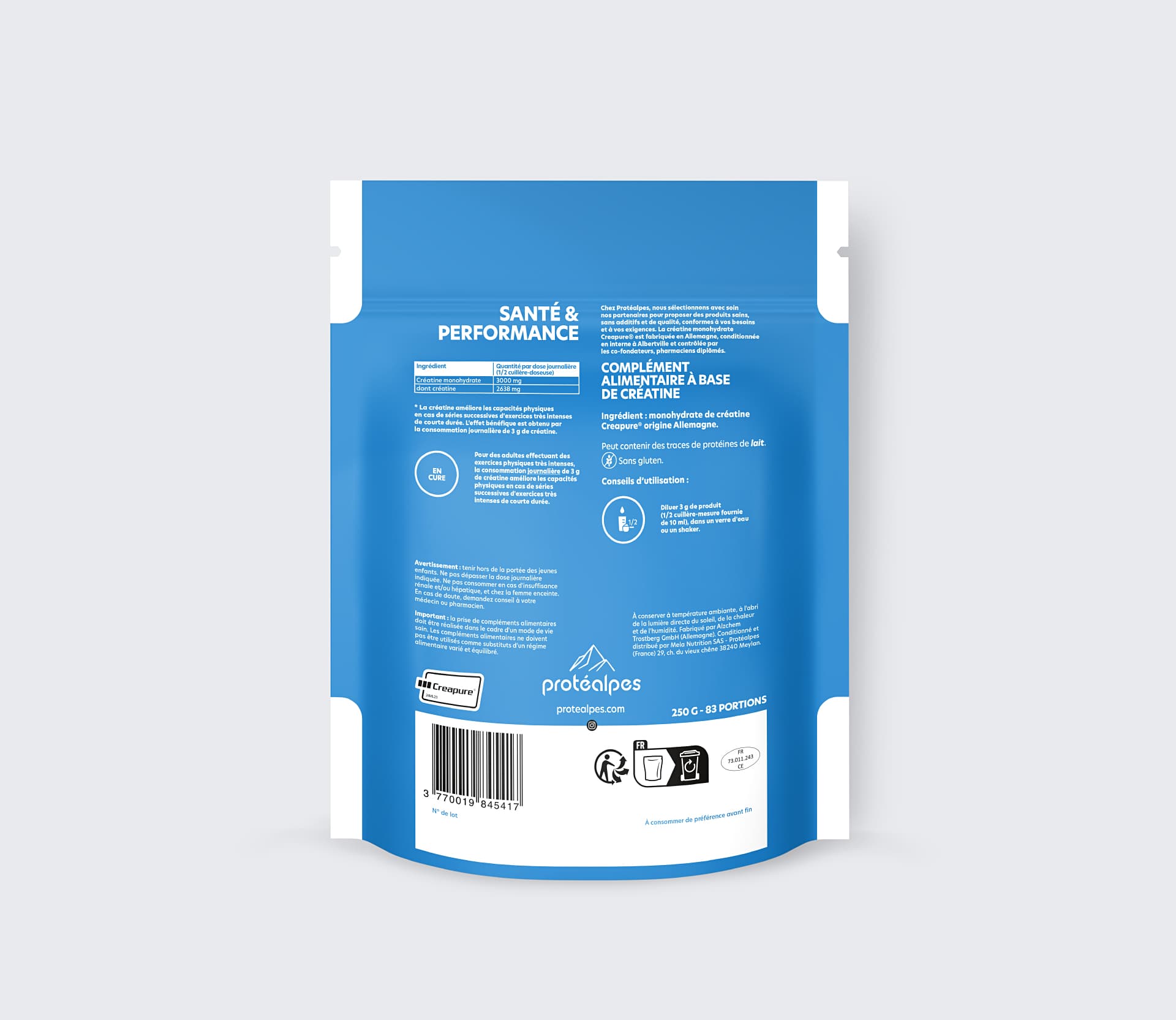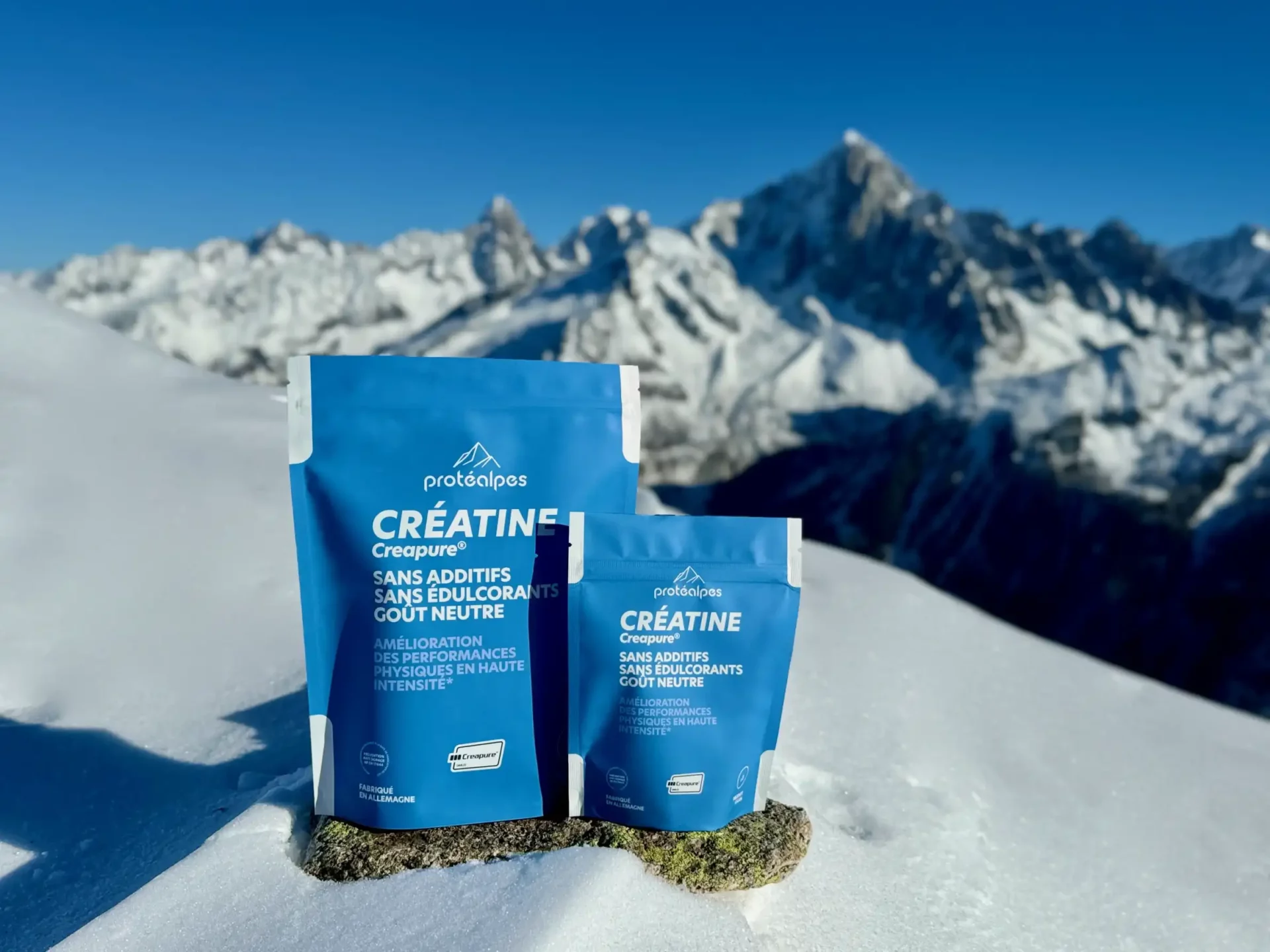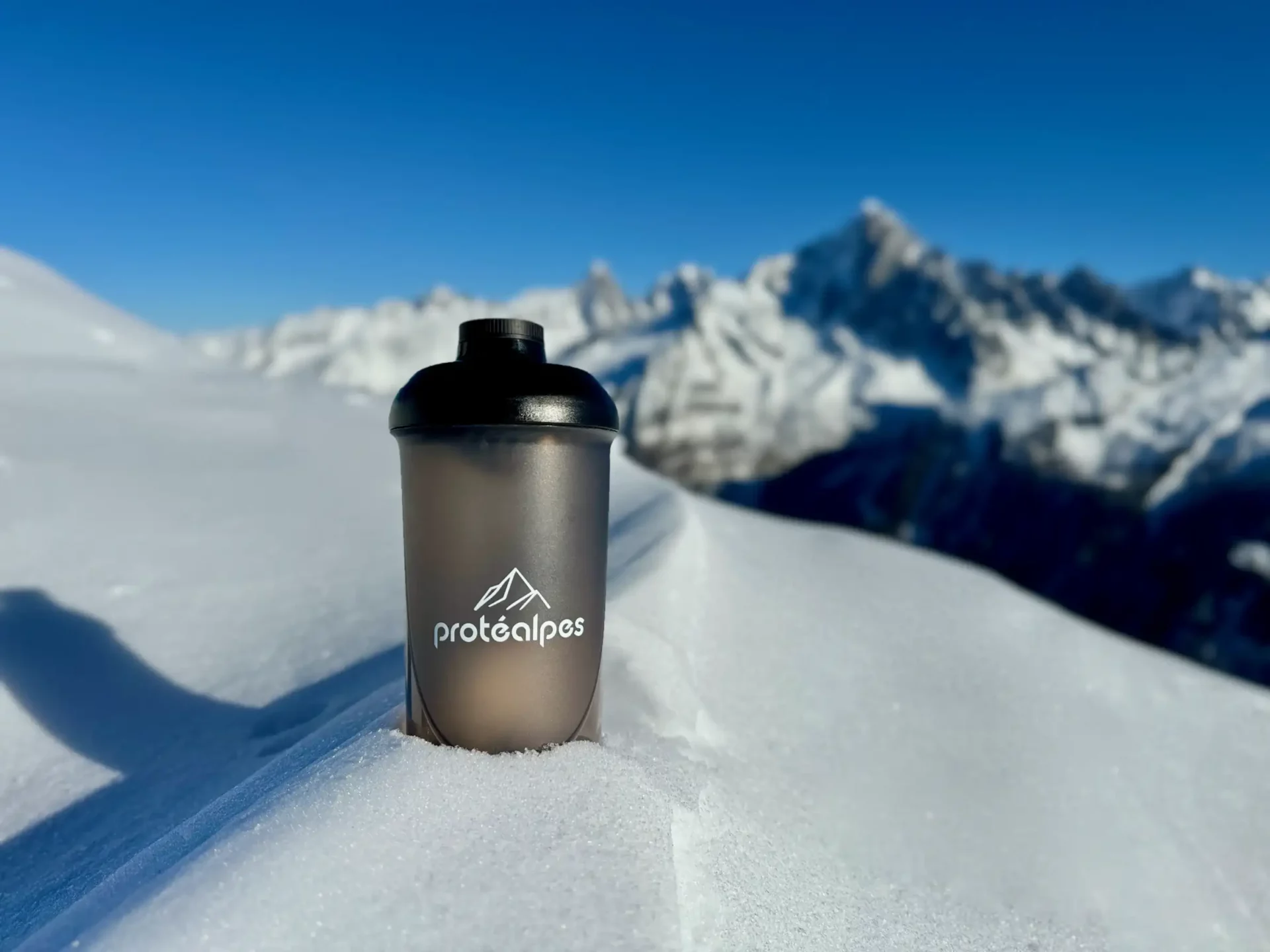


| Creapure® Label Safety, purity, traceability | |
| No additives, no sweeteners | |
| Made in Germany, packaged in Albertville | |
| Improves physical performance under high-intensity conditions*. | |
| Increases muscle strength**. | |
| Standard anti-doping products |
In detail
- Creatine with the Creapure® label
- Made in Germany, packaged by Protéalpes in Albertville
- Standardised without doping substances
- Improves physical performance under high-intensity conditions*.
- Increases muscle strength**.
- No additives, no sweeteners
Ingredient
- Creapure® creatine monohydrate
No additives, no sweeteners (sucralose, aspartame, acesulfame k, steviol glycosides...)
Made in Germany, packaged in Albertville by Protéalpes. May contain traces of milk proteins.



Very detailed description
Ingredient
Ingredient | Quantity per daily dose (1/2 scoop) |
Creatine monohydrate Creapure® | 3000 mg |
of which creatine | 2638 mg |
No additives, no sweeteners (sucralose, aspartame, acesulfame k, steviol glycosides...)
Made in Germany, packaged in Albertville by Protéalpes. May contain traces of milk proteins.
The best for maximizing muscle power and optimizing intensive performance
Creatine is a compound naturally present in muscle cells, ingested through the diet, mainly from meat and fish, but also produced by the human body, notably from the amino acids arginine and glycine.
Creatine provides energy to sustain short, maximum-intensity exercise. The rate of energy production from creatine is very high, but the storage capacity in the muscle is limited; enough to perform 8-10 seconds of maximal exercise, without supplementation.
Creatine monohydrate is a supplement that can increase creatine reserves and subsequently improve performance during high-intensity exercise1,2,3.
- Performance at maximum power1,2,3
- Sprint performance during or at the end of endurance exercise1,4
- Neuroprotection, injury/concussion rehabilitation1,5,6,7
- Muscle recovery1
Creatine & nutrition

- The principles of "diet first" should apply to all supplements, but diet alone is not sufficient to increase muscle creatine to the levels required for a clear performance benefit.
- Muscle absorption of creatine is maximized by the ingestion of carbohydrates due to the effects of insulin. Initial recommendations using large quantities of simple sugars were confirmed with a meal rich in protein (50 g) and carbohydrates (50 g), achieving the same result.
- Creatine should be taken as a course of treatment. It is best consumed post-exercise and/or with main meals (i.e. those containing significant amounts of protein and carbohydrates).
When should it be used?
Apart from the situations listed below, creatine supplementation is not useful and not recommended.
Repeated intense effort1,2,3
Sports involving repeated high-intensity effort. Ex: team sports, racket sports...
Sprints1,4
Short- to medium-duration events where sprints are essential to performance. Ex: athletics, track cycling, rowing, kayaking...
Maximum forces1,2
High-intensity maximum resistance efforts. E.g.: weightlifting, bodybuilding, physical preparation...
Rehabilitation1
Promotes recovery during periods of muscle loss. Ex: injury,
immobilization...
Slight head trauma6,7
Improved cognitive processing in the brain, reduced neuronal damage and recovery. Ex: after a mild head trauma/concussion...
Scientific protocols8
In all cases, follow dosage and scientific protocols. Seek advice from a specialist healthcare professional. As a complement to a healthy lifestyle, intense physical activity and a varied, balanced diet.
Terms of use
- Dilute 3 g of product (1/2 measuring spoon (6 g) supplied) in 300 ml of liquid.
- It is entirely possible, and even advisable, to take creatine in a Whey, ProRecovery or Gainer shaker.
- The 3 g can be spread over the day in 2 or 3 doses, ideally with carbohydrates and proteins.
- To be taken in cures of 1 to 1.5 months, interspersed with breaks of at least as long.
Certificates & labels
Transparency
Why Creapure®?
At Protéalpes, we're used to manufacturing our own nutrition products. However, for creatine, a supplement that has been studied extensively for decades, recognized as healthy over the long term and a genuine ergogenic aid, we have chosen the world leader Alzchem Group (Trostberg, Germany) and its Creapure® label. Our creatine is made in Germany, and we package it ourselves in Protéalpes packs at our Albertville production site.
The purity of creatine is just as important as its efficacy. That's why Alzchem Trostberg GmbH has developed an ultra-secure manufacturing process to produce a product of unrivalled purity.
The company has built its own production plant in Germany, entirely dedicated to creatine. This production facility, combined with regular internal and external quality controls and ongoing scientific analysis, guarantees impeccable quality for every batch produced.
Creapure® label
Producers who affix the Creapure® logo to their packaging demonstrate that their product contains a premium ingredient of German origin, synonymous with confidence and quality.
You can check our membership of this program directly on their website: https: //www.creapure.com/en
Protéalpes' unique QS (Quality Seal) code is: 24ML23
Point pharmacien
Attention to quality
Unlike the proteins or carbohydrates we use in our Protéalpes products, creatine is chemically synthesized, like all creatines on the market. It is therefore crucial to ensure that the intake of this compound is totally free from other substances involved in creatine manufacture. All creatines found on the market claim exceptional purity, but the Creapure® label is the only one that attests to the compound's true purity. As many creatines are produced outside the EU, notably in China, it is very important to control the origin, manufacturing and packaging conditions of this compound.
Please note:
Take into account the impact of a potential 1 to 2 kg increase in body weight caused by natural, reversible water retention after the end of the treatment.
After stopping creatine intake, muscle creatine levels return to baseline after 4 to 6 weeks.
Mild, temporary intestinal disturbances may occur, but these are alleviated with doses divided into 3 or 4 doses, taken during meals, and the avoidance of high-fiber foods during this period.
No evidence of adverse effects with long-term creatine supplementation (4 years) at an appropriate dose, in healthy individuals.
Contrary to popular belief, creatine does not directly increase muscle mass. It does enable you to train more efficiently, with greater loads, and therefore potentiates mass gain, but indirectly.
Individuals with the lowest muscle creatine levels (e.g. vegetarians) have the greatest potential response to supplementation.
Long-term intake
Although studies have shown that taking creatine continuously over several years (even up to 30 g per day) is considered safe, we recommend taking creatine in the form of 1 to 1.5-month cures, interspersed with breaks of at least as long.
Increased dosage
Increasing the dosage during a course of treatment will not increase the effect. The relationship is not proportional, and the optimum remains 3 g per day as a maintenance dose.
Important & Warning
Food supplements should be taken as part of a healthy lifestyle. Dietary supplements should not be used as a substitute for a varied, balanced diet.
Keep out of reach of young children. Do not exceed the indicated daily dose. Do not consume in cases of renal and/or hepatic insufficiency, or by pregnant women. If in doubt, ask your doctor or pharmacist for advice.
Mandatory information related to Regulation (EU) 432/2012
*Creatine improves physical performance in the case of successive series of very intense, short-duration exercises. The beneficial effect is achieved with a daily intake of 3 g of creatine.
**The claim applies to adults over 55 years of age who regularly engage in weight training. The beneficial effect is obtained by the daily consumption of 3 g creatine in conjunction with weight training, which enables a progressive increase in workload and should take place at least three times a week for several weeks, with an intensity equivalent to at least 65%-75% of a maximum repetition load.
Scientific sources
1Musclecreatine loading in men - by Hultman et al - 1996
2InternationalSociety of Sports Nutrition position stand: safety and efficacy of creatine supplementation in exercise, sport, and medicine - by Kreider et al - 2017
3Effectsof creatine supplementation and resistance training on muscle strength and weightlifting performance - by Rawson and Volek - 2003
4CreatineSupplementation and Upper Limb Strength Performance: A Systematic Review and Meta-Analysis - by Lanhers et al - 2017
5Creatinesupplementation and endurance performance: surges and sprints to win the race - by Forbes et al - 2023
6DietarySupplements for Health, Adaptation, and Recovery in Athletes - by Rawson et al - 2018
7Beyondmuscle: the effects of creatine supplementation on brain creatine, cognitive processing, and traumatic brain injury - by Dolan et al - 2019
8CreatineSupplementation and Brain Health - by Roschel et al - 2021
Product Reviews
- It gives the little extra for a few extra reps, which suits me fine.
-
Great product!
-
The cure hasn't started yet...
-
Very good
-
Very good
-
Very good, with no particular taste. Just the creatine supplement I was looking for, unlike other brands which tend to add chemical ingredients to give taste.
FAQ
Frequently asked questions about creatine :
1. What are the benefits of creatine?
Studies show a 10-20% improvement in high-intensity performance (muscular strength). The effects are particularly marked for short, intense efforts lasting less than 30 seconds (muscular power, sprints, jumps, etc.).
Creatine provides significant benefits for sports performance and muscle recovery. By rapidly replenishing ATP (adenosine triphosphate) stores via phosphocreatine, it helps athletes improve muscular contraction during short, intense workouts.
It also makes for better training, indirectly helping to increase muscle volume if the effort is a bodybuilding one. In this case, mass gain progresses more easily and post-workout recovery is optimized.
Main scientifically proven physiological effects:
- In terms of energy :
- Increased ATP production
- Improved anaerobic capacity
- Reduced muscle fatigue
- Muscular level :
- Increased maximum strength and bodybuilding performance
- Optimizing protein synthesis
- Muscle power development
- Improved post-workout recovery
- Increased training volume possible
- At the neuronal level :
- Central nervous system protection and post-concussion recovery
2. How many grams of creatine per day?
The recommended daily dose is 3 grams of creatine monohydrate, to be taken for 4-6 weeks, every day, as a course of treatment.
From a scientific point of view, regarding the best creatine dosage, 2 validated protocols exist:
With load phase :
- 20g/day for 5 days (4x5g)
- Then 3g/day for maintenance
Without load phase :
- 3g/day directly
- More progressive results
3. How to take creatine
Creatine is taken as a course of treatment, with breaks equivalent to the duration of intake.
Creatine can be consumed :
- As a powder in a liquid (powdered creatine has a neutral flavour)
- Mixed with a protein shaker, ideally with carbohydrates
Whether in powder or capsule form, the product has the same creatine monohydrate molecule and the same energy benefits. The desired results do not vary. Consumption depends above all on the user's habits.
4. What dose of creatine for women?
Women should follow the same dosage protocol as men: 3-5g creatine monohydrate per day.
Studies show that women have 70-80% lower endogenous creatine reserves than men.
No dose adjustment is required for different genders. Physiological response to creatine is similar.
5. When should you take creatine?
It doesn't really matter when you take creatine, as its effects are linked to long-term muscle saturation. Whether you take it pre-workout or post-workout depends more on your habits than on maximizing its effects, although post-exercise, with the recovery ration, seems to be the most appropriate method.
Key points for optimum grip :
- With carbohydrates to optimize absorption (or whey protein)
- Split doses if necessary
- Maintain a regular intake
6. Which sports benefit from creatine?
Bodybuilding, fitness and weightlifting benefit from creatine's enhanced anaerobic capacity. Any high-intensity, short-duration sport, such as crossfit or swimming, also benefits. High-intensity endurance sports such as team sports (rugby, soccer), kayaking and cross-country skiing also benefit from creatine.
Sports where creatine is particularly effective:
- Power sports :
- Bodybuilding
- Weightlifting
- CrossFit
- Explosive sports :
- Sprint in athletics
- Short-distance swimming
- Combat sports
- Badminton
- Team sports :
- Rugby
- Soccer
- Field hockey
Nevertheless, creatine does not provide any significant advantage for pure endurance sports.
7. What happens when creatine is stopped?
Muscle creatine levels gradually return to their initial state within 4-6 weeks of stopping. If training is not stopped, the body will not lose the muscles acquired during the period, nor the performance gains.
Effects observed :
- Loss of water retention (1-2kg)
- No negative rebound effect
Take care to plan breaks between courses of treatment of a duration equivalent to the period of intake.
8. Does creatine have any side effects?
Creatine (creatine monohydrate) is an organic compound derived from three amino acids (glycine, arginine and methionine). It is safe according to scientific consensus and medical studies. It is one of the most extensively studied dietary supplements in recent years, widely used by top-level athletes, and has no doping effect.
This means that there is no major danger, even with a naturally slightly higher creatinine level during normal use. The main side effect is sometimes intestinal discomfort. No significant risk to renal function in healthy individuals. Potential water retention is sometimes observed, but this is temporary and natural.
Creapure® creatine monohydrate represents the best option in terms of purity and proven efficacy. The Creapure® label is the only guarantee of pharmaceutical quality.
Essential selection criteria :
- Creapure® seal of purity
- Tested German manufacture
- No additives or sweeteners
- Complete traceability (production, storage, packaging, etc.)
Other forms of creatine (phosphate, ethyl ester) have been much less extensively studied, and have shown no superiority to creatine monohydrate.
9. How long does it take for creatine to take effect?
The effects of creatine appear between 5 and 15 days after the start of supplementation.
Action time depends on the protocol chosen:
- With loading phase (20g/d over 5 days): effects from 5-7 days
- Without loading phase (3g/d): effects after 15-20 days
10. Does creatine make you lose weight?
Creatine has no direct effect on weight loss or fat reduction.
Creatine influences weight in two ways:
- Potential temporary water retention, non-pathological, reversible (+1-2kg)
- Indirectly aids fat loss by enabling more intense workouts
In the dry phase, water retention can be problematic for muscle definition, but it varies greatly from profile to profile and is not compulsory. It is often linked to the loading phase and diminishes as the cure progresses.
11. Should I take creatine to build body mass?
Creatine indirectly promotes mass gain by enabling heavier, bulkier workouts.
Effects on weight gain :
- Increased strength for heavier lifting
- Improved training volume possible
- Optimizing muscle recovery
Creatine alone is not enough; it must be combined with a calorie surplus and an adequate protein intake.
12. Should I choose between whey and creatine?
Whey is a protein source used for muscle recovery and building, both structurally and nutritionally. Creatine, on the other hand, is an energy compound for optimizing the ATP reserves available for short-duration, high-intensity efforts.
These fundamental differences make them complementary allies in sports performance!
| Features | Whey | Creatine |
| Nature | Whey protein | Nitrogen compound |
| Origin | Milk | Summary |
| Main action | Muscle building | Power generation |
| Timing | Post-training | Flexible |
| Duration of use | Continue | Spa treatments |
Whey :
- Muscle repair
- Support for protein synthesis
- Post-exercise recovery
- Maintaining muscle mass
Creatine :
- Maximum strength improvement
- Increased explosiveness
- Performance sur efforts courts (<30 sec)
- Optimizing training volume
- Recovery aid
The two supplements are compatible and even complementary, particularly for mass gain. Whey and creatine, taken together after training, offer excellent synergy.
















